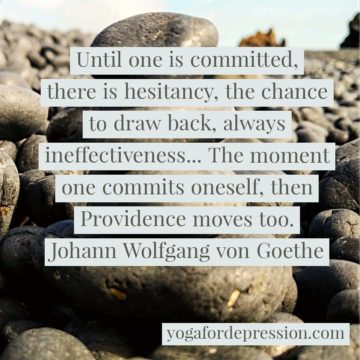
As many of us set goals for the 2023, the biggest struggle is finding success in achieving those goals. This post explores some tips to help you have better success at getting what you want this year.
Here we are, embarking on a new year. Today is an opportunity to start things fresh. Yes, we arbitrarily select days that fall into alignment with a calendar and decide that we can have a fresh start and create new goals. Days like Mondays, birthdays, the beginning of the month, and New Year’s Day represent this new beginning. This is an important practice. We are resetting our minds and our energies. It only becomes a problem when we judge ourselves for not following through.
January 1st, I led my annual New Year’s Day Retreat (available here). One of the questions that came up was “how do you make achieving a goal easier?” How do we make that goal, whatever it is, something that we can obtain? To quote a favorite movie of mine, What About Bob?, baby steps. Take your goals and break them down into simple and easy steps.
Let’s say that I have a goal of better health.
- What does better health mean and what does it look like? In other words, how will I know that I have achieved better health? There are likely multiple measurements such as how I feel, energy levels, endurance, sleep, food intake, weight (I know this is a touchy subject, but let’s be honest, some of us still use this as a metric and I will be the last person to shame someone for it). etc. I need to be detailed in this goal.
- Break the goal down into 12 parts. Where should I be after 30 days? What actions do I need to take each week to see progress at the end of a month?
- Break the monthly goal down into 4 parts. Where should I be at the end of a week? What actions do I need to take daily to get to better health. For example, if eating better food is part of better health, then one of my daily activities is eating something green. Perhaps it is no snacking between meals.
- Now that the actionable items are in play, it is time to put that somewhere I can see them. I could use my phone calendar to pop up a reminder. A success tracker is also a good idea. I can meet my goal of being more creative by using a bullet journal to create my own success tracker.
- Accountability is a big part of success. I need someone to ask me about how I am doing, or someone that is willing to go for a walk with me a couple of times a week. Involve someone who is willing to help and push. My husband is great at this. As soon as I tell him my goal is eating something green every day, he will ask me about it every day.
- Make it fun. Achieving a goal is supposed to feel good. I might reward my success with a massage, or a new pair of pants, etc. And I want it to be fun along the way. Some gyms now have cardio cinema, a room where they play movies while you do cardio! Sure, it’s missing the popcorn, but I think I will live.
- Consider a penalty clause. Whoa, that sounds hardcore, but fear is a great motivator. What are the consequences if I do not stick with my goal? My day trip to the beach in June might get cancelled. I don’t want to be mean to myself and at the same time personal accountability is an important lesson in life.
- Involve friends. Going for a walk by myself is nice. Going for a walk with a friend is better. If I had a four-legged best friend, they would make me go for a walk twice a day.
- Add an emergency clause. What will I do if something comes up and I cannot meet my daily obligation? This is the compassion part of the practice. Making allowances for failure is important. Sometimes failure is a reminder of why I started down this path in the first place. If I shame myself for failing, instead of using it as motivation, I have done myself a deep disservice.
Personal and spiritual growth is not easy, but it is necessary for our lives to flow with ease. Without this expansion, we remain stuck in the past and our suffering. Just as the seed must be destroyed for the tree to grow, this process is not without struggle and difficulty. Looking back, we find that the journey was worth it.
“Until one is committed, there is hesitancy, the chance to draw back, always ineffectiveness… The moment one commits oneself, then Providence moves too.”
Johann Wolfgang von Goethe
Great info, Rose. Have studied it before in different forms but so enjoy hearing it again and again.